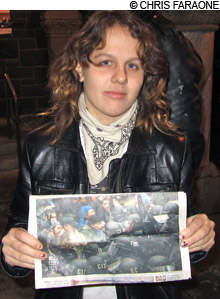
LIZ NICHOLS, seen holding the now-iconic picture of herself getting doused by Portland police pepper spray, is an example of the resilience that’s keeping battered West Coast Occupiers’ spirits afloat. Despite losing her gear and having the house she was staying in raided by police, Nichols says, “I’m doing pretty good.” |
PORTLANDFRIDAY Authorities in Portland have been playing whack-a-mole with Occupiers for a week now. After Mayor Sam Adams warned that on November 13 he'd shut down two settled camps — located across the street from one another in downtown Portland —police went in two days early, beginning a tense and prolonged showdown leading up to the planned eviction. When clean-up cops — dressed in riot gear, gripping fistfuls of pepper spray — finally came to Chapman and Lownsdale squares on the 13th, the ensuing clash resulted in 51 arrests, a public transportation shutdown, and the dislocation of several hundred Occupiers, many of whom had been there since October 6.
Following that wipeout, many Occupiers shacked up with friends in nearby college dorms and apartments, some of which are still sleeping more than 15 to a living room. They've also gotten love from local churches, which continue to provide food, meeting space, and even shelter. All prior communications with municipal authorities were severed after the raid, leaving hundreds of Occupiers indefinitely homeless, but not undetermined. A rogue bunch tried to hold down Terry Schrunk Plaza — a federal space near the two city parks that got scrubbed — but couldn't stay for long. The week before, on Guy Fawkes Day, 10 were jailed after chaining themselves to a cement-filled drum in the plaza and refusing to leave.
I arrive in Portland on a damp and dreary afternoon and find a half-dozen Occupy organizers meeting with young labor leaders at the First Unitarian Church. It's an intimate engagement, so I announce myself, and they agree to let me listen in. They mostly talk tactics and about actions coming up on Sunday. Specifically, the Occupy representatives are preparing for an event called "Meet the Occupation," in which union workers, their families, and other community members can come and see that Occupiers don't bite. Due to several televised spats with the law, and some of the laziest news coverage of Occupy that I've seen clean across the country, their image has suffered among Oregonians. This team hopes to fix what might be the movement's worst PR problem anywhere.
Two blocks away, at 7 pm, I find the rest of the nomads inside the First Congregationalist Church, where about a dozen gentle-hearted parishioners are accommodating Occupiers with ramen noodles, coffee, and a space for their weekly spokescouncil — an all-encompassing meeting in which one delegate from each working group presents progress updates. In a magnificent hall on the second floor, about 200 people — bearded old-school long-hairs, a tattooed lumberjack in a wife beater, several hipsters dressed like Pippi Longstocking — listen attentively as facilitators recap the past few days of setbacks, then disperse the bunch into breakout sessions to engage business on everything from shelter to upcoming Black Friday actions.
Meanwhile, downstairs in the church basement, I meet some kind twentysomethings in spike-clad coats and cut-off gloves who are sitting with all of their possessions packed in duct-taped bags by their feet. They tell me they don't have much left since their eviction from camp; Carmen, a 25-year-old who moved here three years ago from North Dakota, says she's out a blanket, shoes, tent, tarp, and clothes. After we hang for a bit she also says that her street friends — affectionately known as "the concrete kids" — believe that their puppy Chubbs was bulldozed along with all the gear. As she's saying this outside over a cigarette, I hear screams of joy and see a mob swarm around a young woman. It's Liz Nichols, their friend who'd overnight become a national Occupy icon for a picture of her swallowing a mouthful of pepper spray. I wait for things to calm down, make my way toward her, and stupidly ask how she's doing. "Considering that I was pepper-sprayed, that I can't find any of my stuff, and that I just found out that the abandoned house we've been crashing in was raided by cops overnight while I was in jail — I'd say that I'm doing pretty good."